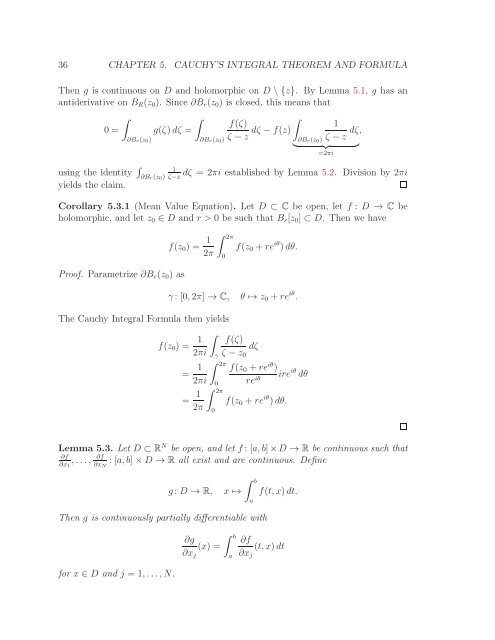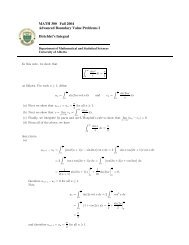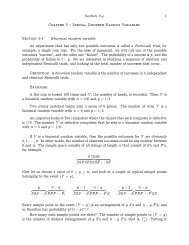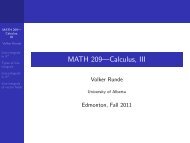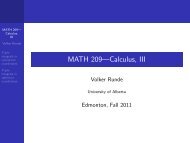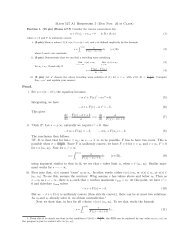Math 411: Honours Complex Variables - University of Alberta
Math 411: Honours Complex Variables - University of Alberta
Math 411: Honours Complex Variables - University of Alberta
You also want an ePaper? Increase the reach of your titles
YUMPU automatically turns print PDFs into web optimized ePapers that Google loves.
36 CHAPTER 5. CAUCHY’S INTEGRAL THEOREM AND FORMULA<br />
Then g is continuous on D and holomorphic on D \ {z}. By Lemma 5.1, g has an<br />
antiderivative on BR(z0). Since ∂Br(z0) is closed, this means that<br />
�<br />
0 =<br />
∂Br(z0)<br />
using the identity �<br />
yields the claim.<br />
�<br />
g(ζ)dζ =<br />
∂Br(z0)<br />
∂Br(z0)<br />
�<br />
f(ζ) 1<br />
dζ −f(z)<br />
ζ −z ∂Br(z0) ζ −z dζ,<br />
� �� �<br />
=2πi<br />
1 dζ = 2πi established by Lemma 5.2. Division by 2πi<br />
ζ−z<br />
Corollary 5.3.1 (Mean Value Equation). Let D ⊂ C be open, let f : D → C be<br />
holomorphic, and let z0 ∈ D and r > 0 be such that Br[z0] ⊂ D. Then we have<br />
Pro<strong>of</strong>. Parametrize ∂Br(z0) as<br />
The Cauchy Integral Formula then yields<br />
f(z0) = 1<br />
� 2π<br />
f(z0 +re<br />
2π 0<br />
iθ )dθ.<br />
γ: [0,2π] → C, θ ↦→ z0 +re iθ .<br />
f(z0) = 1<br />
�<br />
2πi<br />
= 1<br />
2πi<br />
= 1<br />
2π<br />
γ<br />
� 2π<br />
0<br />
� 2π<br />
0<br />
f(ζ)<br />
dζ<br />
ζ −z0<br />
f(z0 +re iθ )<br />
re iθ ire iθ dθ<br />
f(z0 +re iθ )dθ.<br />
Lemma 5.3. Let D ⊂ RN be open, and let f: [a,b]×D → R be continuous such that<br />
: [a,b]×D → R all exist and are continuous. Define<br />
∂f ∂f<br />
,..., ∂x1 ∂xN<br />
� b<br />
g: D → R, x ↦→ f(t,x)dt.<br />
Then g is continuously partially differentiable with<br />
for x ∈ D and j = 1,...,N.<br />
� b<br />
∂g ∂f<br />
(x) = (t,x)dt<br />
∂xj ∂xj<br />
a<br />
a


